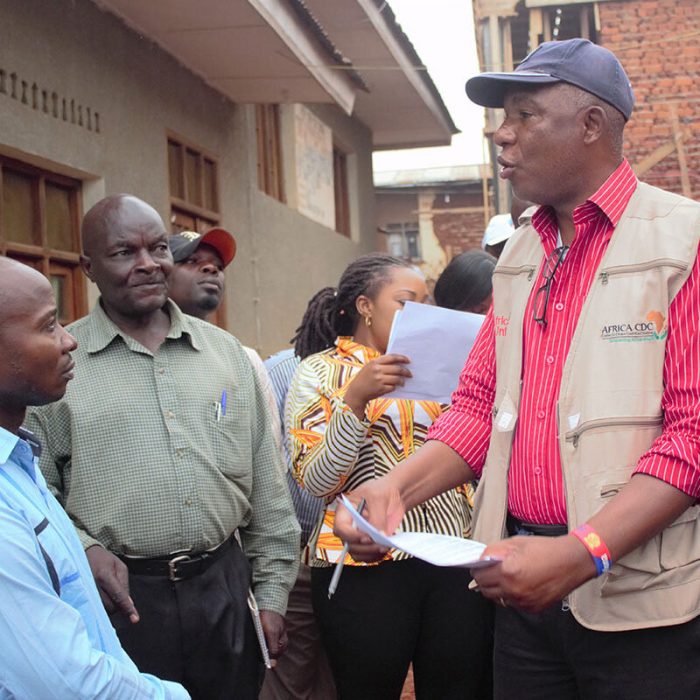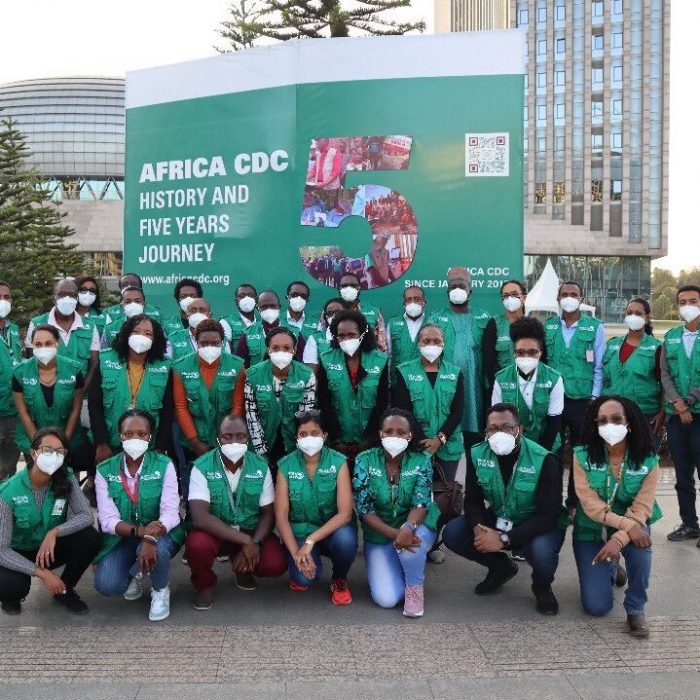ABOUT
CPHIA
The annual International Conference on Public Health in Africa (CPHIA) is organised by the Africa Centres for Disease Control and Prevention (Africa CDC) and provides a unique African-led platform for leaders across the continent to reflect on lessons learned in health and science and to share innovative and practical evidence-based public health solutions to champion Africa’s health challenges. The 2024 conference has been postponed.
CPHIA aims to engage this diverse gathering to support building strong, resilient and equitable health systems, preparing Africa for the next pandemic and accelerating the local manufacturing of vaccines, therapeutics and diagnostics in Africa. This year’s conference theme is: “Moving Towards Self-reliance to Achieve Universal Health Coverage and Health Security in Africa”
CPHIA was first held virtually in 2021 and in-person in 2022 and 2023 in Kigali, Rwanda, and Lusaka, Zambia, respectively. CPHIA has become the largest health conference globally.
As African countries accelerate the realisation of universal health coverage, annual CPHIAs are helping define how the continent can become more self-reliant in the delivery of public health solutions to achieve a healthier, more prosperous Africa.
Conference Postponement FAQs
General
Rescheduled dates for CPHIA 2024 have not yet been determined. The conference organisers are actively working to determine the new dates and will communicate updates soon.
There is no need for travel restrictions to or from Africa due to mpox and this was not a factor in postponing the conference. Africa CDC Director General H.E. Dr Jean Kaseya has urged countries not to repeat the unfair travel bans imposed on African countries during the COVID-19 pandemic.
Please contact your hotel or airline to see if your purchase qualifies for a refund.
Abstracts
The abstract submission deadline was 31 October 2024 by 23:59hrs EAT/20:59hrs UTC. No further submissions will be accepted.
- Due to the postponement, the organising committee is removing the priority status given to abstracts that have not yet been presented at any other scientific conference.
- All abstracts will be evaluated without regard to whether they have been included in other conferences.
The timing of acceptance notices will be determined by the dates of the rescheduled conference. An updated timeline will be provided as soon as possible.
Edits cannot be made to an abstract once it has been submitted. However, in the event that your abstract is selected for an oral or poster presentation and has undergone significant changes after acceptance, those changes should be highlighted in the abstract presentation.
No, there is no need to notify CPHIA 2024 if you submit your abstract elsewhere during this postponement.
All updates regarding abstract submissions will be emailed to submitters, as well as posted on the conference website.
Side Events & Exhibitions
The timing of acceptance notices will be determined by the dates of the rescheduled conference. An updated timeline will be provided as soon as possible.
2024 Conference Tracks and Subthemes
Subthemes:
- Secure the demand through new procurement channels (pooled procurement platforms, Public Private Partnerships and innovative reform of healthcare expenditure and health insurance).
- Sustained investments: Bankable projects and an environment conducive for financially sustainable business. Attracting foreign direct investment and leveraging of domestic resources.
- Building resilient regulatory systems: strengthened Africa National Regulatory Authorities (NRAs) and harmonized operating models throughout the continent including the role of Africa Medicines Agency (AMA)?
- End-to-end R&D development including Active Pharmaceutical Ingredients (APIs): Research, innovation, and all the levels of clinical trials.
- Identify, build and nurture critical talent to work and advance health product manufacturing capabilities in Africa.
- Funding and the role of private sector and start-ups.
Subthemes:
- Bridging the gap: Exploring and evaluations of innovative health financing mechanisms for Universal Health Coverage (UHC).
- Sustaining health for all: Promoting innovative pathways to sustainable health financing in Africa.
- Securing health for all: Strategic resource mobilization for UHC and health security in Africa.
- Building trust and resilience: Fostering financial governance and accountability for health systems in Africa.
- Synergy for success: Integrating financing strategies with health priorities to transform Africa’s health systems.
Subthemes:
- Strengthening primary health care equity via whole-of-society engagement.
- Enhancing Primary health care through technology: AI, health information systems, and innovative care models.
- Building a fit-for-purpose health workforce: Bridging the gap in Africa.
- Harnessing the resilience of primary health care (PHC) to meet emerging health and well-being challenges.
- Addressing social and environmental determinants for achieving UHC.
- Implementing ‘Health in All Policies’: Realizing the Astana declaration’s vision.
- Leveraging partnerships to enhance health regulatory systems.
Subthemes:
- Digitalising primary health care: Leveraging digital transformation and AI for improved service delivery.
- Precision health and AI: Enhancing decision making and service delivery.
- Addressing health disparities through digital health: Gender, equity, and inclusion.
- Innovative financing models for digital health solutions.
- Telemedicine and AI: Extending reach and access to health care services.
Subthemes:
- Research for climate change and health outcomes.
- Policy frameworks for One Health and UHC.
- Digital tools for health security and climate preparedness.
- Community engagement in climate change and One Health.
Subthemes:
- Women and youth as users and providers of health care.
- A life course approach to enhance maternal mortality rates and life trajectories of infants, children and youth.
- Harnessing the power of youth in Africa: Modernizing health care systems through digital platforms.
- Health impacts of climate change, violence and forced displacement of women and youth.
- The rapidly growing substance use epidemic in Africa – threats to women and youth.
- Strengthening primary health care to bolster child health.
Subthemes:
- Integrated health systems for disease responses in the context of primary health care: Challenges and opportunities in Africa.
- Innovative solutions and partnerships to prevent and control the rising burden of non-communicable diseases (NCDs) and injuries.
- Lessons from the investment and management of historically high-burden diseases (HIV/AIDS, Malaria, and TB) to enhance current strategies and inform new horizons for other disease responses.
- Mental health and substance use disorders: Successful public health initiatives as case studies that can be replicated with contextualization.
- Neglected tropical diseases: Lessons learnt to accelerate the elimination agenda.
Subthemes:
- Vaccines as the most effective way to prevent the spread of pandemics: Manufacturing, acceptance and uptake.
- Advancing disease surveillance to cope with epidemic and pandemic situations.
- Role of laboratory in pandemics: Towards multiple point of care tests for epidemic prone diseases.
- Global and regional collaboration for health security, including pandemic response.
- Addressing misinformation and disinformation in pandemic response.
- Innovations for enhanced multi sectoral surveillance and response to emerging and re-emerging diseases.
- National and sub-national public health institutions.
ABOUT
AFRICA CDC
The Africa Centres for Disease Control and Prevention (Africa CDC) is a specialized technical institution of the African Union established to support public health initiatives of Member States and strengthen the capacity of their public health institutions to detect, prevent, control and respond quickly and effectively to disease threats. Africa CDC supports African Union Member States in providing coordinated and integrated solutions to the inadequacies in their public health infrastructure, human resource capacity, disease surveillance, laboratory diagnostics, and preparedness and response to health emergencies and disasters.
Established in January 2016 by the 26th Ordinary Assembly of Heads of State and Government and officially launched in January 2017, Africa CDC is guided by the principles of leadership, credibility, ownership, delegated authority, timely dissemination of information, and transparency in carrying out its day-to-day activities. The institution serves as a platform for Member States to share and exchange knowledge and lessons from public health interventions.


Sign up for updates
Be the first to know when registration launches.

Menu
